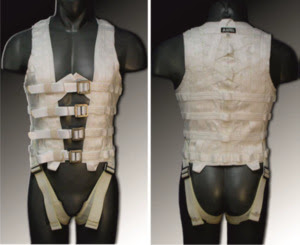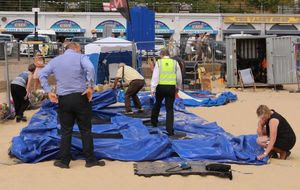Health and safety reminders for all professionals

| Keep workers stay safe and warm, urges HSE |
Great Britain’s workplace regulator, the Health and Safety Executive, is stressing the importance of protecting workers during the cold weather. It comes as the Met Office has issued a yellow weather warning for ice and snow for parts of the UK.
John Rowe, head of operational strategy said, “We’re calling on all employers to take a sensible approach during the cold weather that is coming our way. There are lots of jobs that will be more difficult in the these conditions. Most employers will recognise this and make appropriate accommodations for their staff. That is the right thing to do.
“It’s also important employers ensure staff are working in a reasonable temperature. People working in uncomfortably cold environments are less likely to perform well and more likely to behave unsafely because their ability to make good decisions deteriorates.”
Temperatures in indoor workplaces are covered by the Workplace (Health, Safety and Welfare) Regulations 1992, which place a legal obligation on employers to provide a “reasonable” temperature in the workplace.
All employers are expected to ensure indoor workplaces are kept at a reasonable temperature. The Approved Code of Practice suggests the minimum temperature should normally be at least 16 degrees Celsius. If the work involves rigorous physical effort, the temperature should be at least 13 degrees Celsius.

| Stunt performer sustained life-changing injuries |
Stunt performer sustained life-changing injuries
Joe Watts, from Surrey, sustained life-changing injuries after he fell approximately 25 feet at Warner Bros. studios in Leavesden, Hertfordshire on 22 July 2019. He had been filming a fight scene for the action movie.
Mr Watts fell 25 feet onto the concrete floor below when the line on his stunt vest became detached.
As a result of his fall, Mr Watts suffered a fractured skull and a severe traumatic brain injury, which has resulted in permanent impairment and disability.
A Health and Safety Executive (HSE) investigation found several failings by FF9 Pictures Limited. FF9 Pictures Limited’s risk assessment failed to address the potential issue of a rope snap or a link failure, there was no system for double checking that the link had been properly engaged and tightened. There was also no system for checking the link for signs of deformation or stretching between takes, the manufacturer’s website stated that the link used was forbidden for use as PPE and shock loading should be avoided. On top of that, six-monthly inspections of harnesses were required but Mr Watts’ harness had not been inspected in the last six months and FF9 Pictures Limited did not extend the crash matting needed to mitigate the consequences of an unintended fall following changes to the set and the sequence of the stunt.

Tackling psychological health, safety, and wellbeing at work
In the service sector, psychosocial risks are often more significant than those from physical hazards. This includes jobs that are particularly vulnerable to psychological harm – such as the emergency services.
Historically, many organisations have been hesitant to address psychological health and wellbeing, due in part to the stigma associated with mental ill-health. However, today’s workers, and especially the younger generation, are more aware of their psychological health and expect their employer to support their mental health and wellbeing. Organisations need to address these expectations to ensure they can attract and retain the talent they need to sustain their activities.
What are psychosocial risks?
Psychosocial risks are those which can arise from exposure to work-related hazards of a psychosocial nature. The risk is the combination of the likelihood of exposure to such a hazard and the severity of the injury or ill-health that it causes. Psychosocial hazards fall into three categories:
- Aspects of work organisation,
- Social factors at work,
- And issues related to the work environment, equipment, or hazardous tasks.

The inflatable trampoline Ava-May Littleboy had been playing on exploded, ejecting her high into the air.
Ava-May, from Somersham in Suffolk, had been taken by family and friends to the Bounce About attraction that had been set up on the beach at Gorleston-on-Sea in Norfolk, on July 1, 2018.
She and a nine-year-old girl were on the trampoline when the blast happened without warning. While the older child suffered minor injuries, Ava-May was thrown upwards – witnesses described her as being shot up between 20 and 40 feet, or the height of a house. She landed on the beach. In the process, she sustained fatal head injuries.
In a tribute, Ava-May’s mother said a family tradition is now to spend Ava-May’s birthday at her bench in the local park.
Johnsons Funfair Limited, trading as Bounce About, operated a number of bouncy castles, slides and other inflatables on the beach at Gorleston, and at another site on Great Yarmouth beach.
Great Yarmouth Borough Council worked with the Health and Safety Executive (HSE) on a joint prosecution. Charges were brought against Johnsons Funfair Limited and its operations manager, Curt Johnson, whose wife was sole owner and director of the company.
The investigation found that Curt Johnson, on behalf of the company, had imported the inflatable trampoline into the UK from China in 2017 and had put it into use without carrying out any of the required testing and certification to ensure it was safe to be used by the public. An importer of such an item equipment must ensure that there has been a proper review of the design, verification that the item has been manufactured in accordance with the design, and a detailed test by a suitable expert on the item’s arrival in the UK. None of that had been done here.
In operational terms, there had been no proper risk assessment or work procedure laid down, and the company used undertrained staff paid cash in hand, some of them too young to work without child work permits which were not sought and would not have been granted for work at such a fairground.
